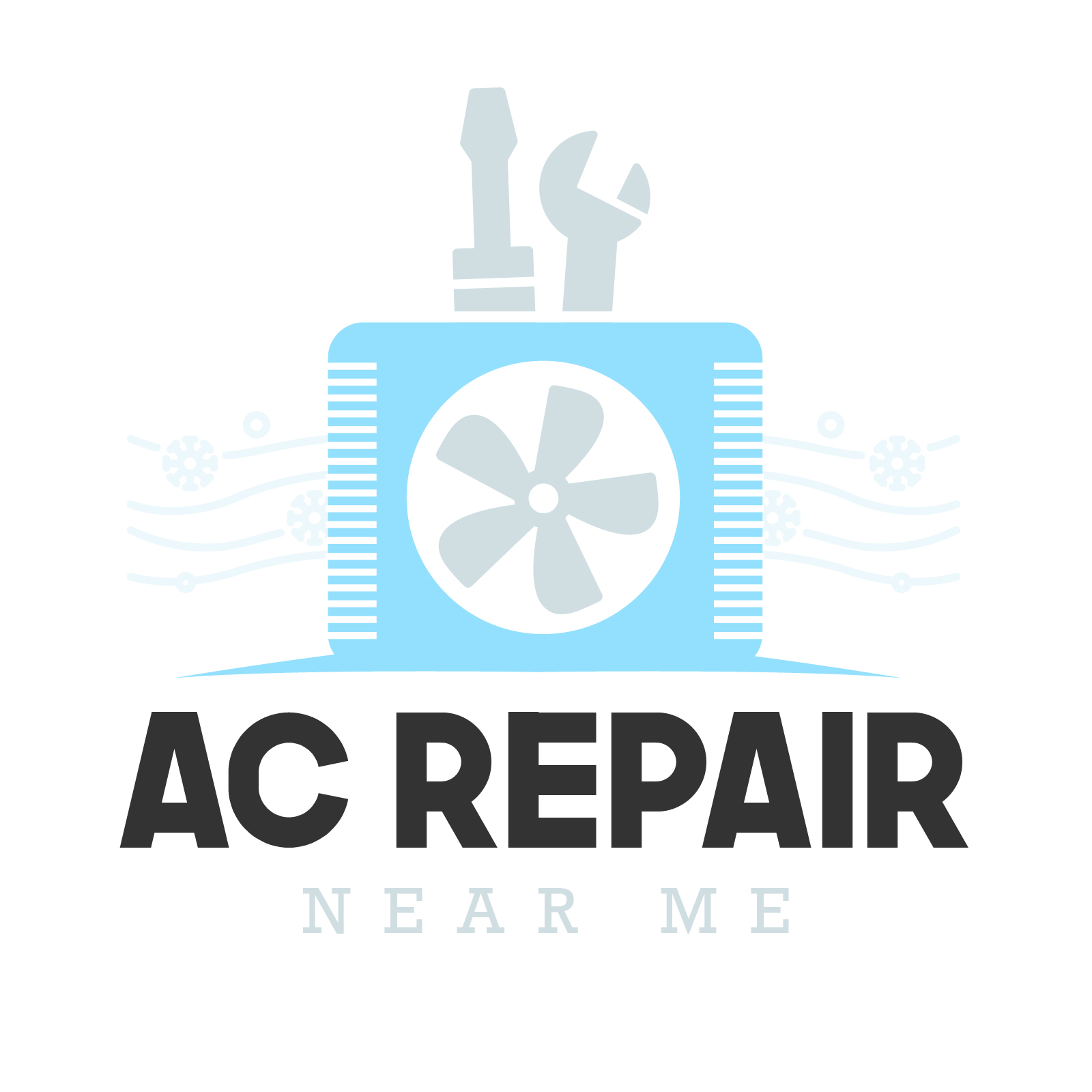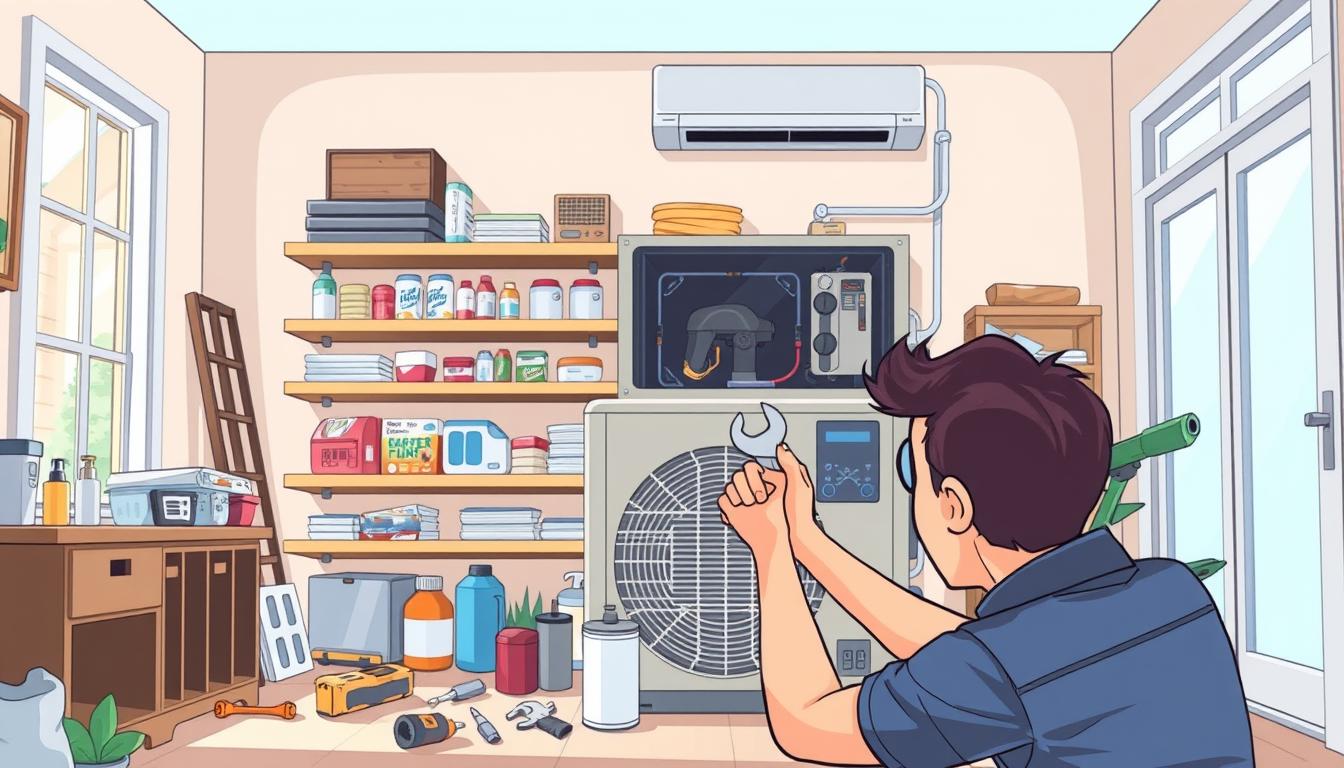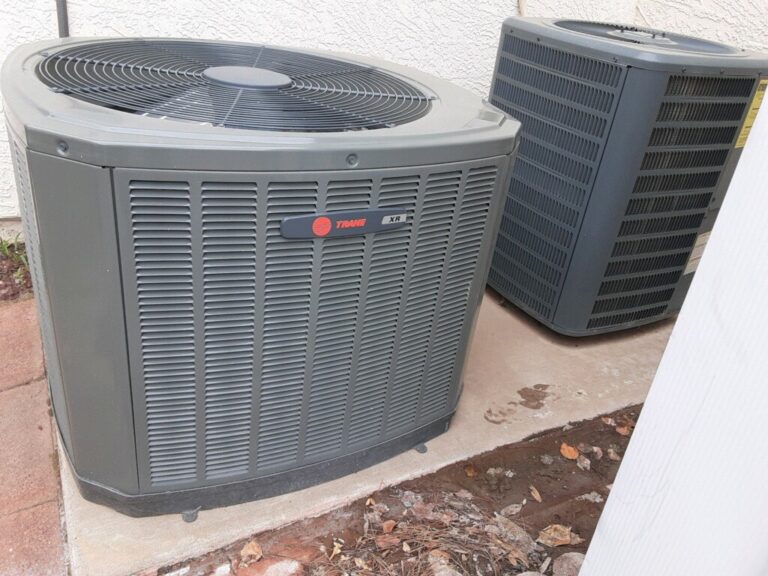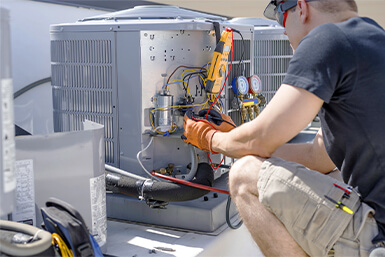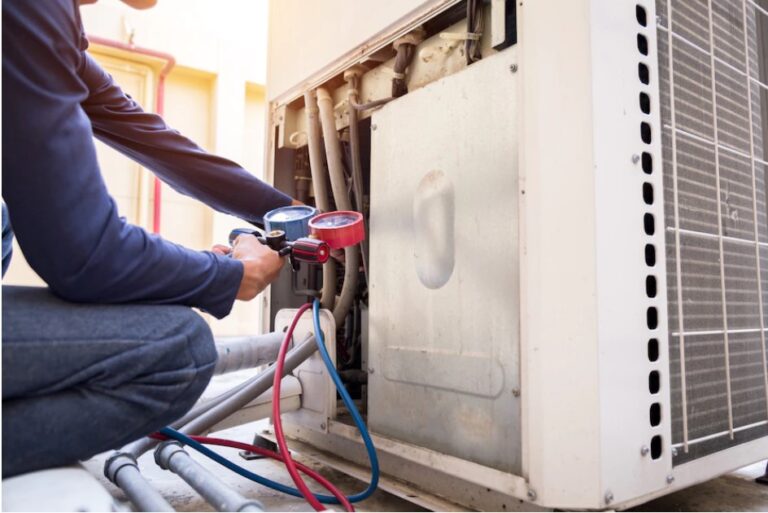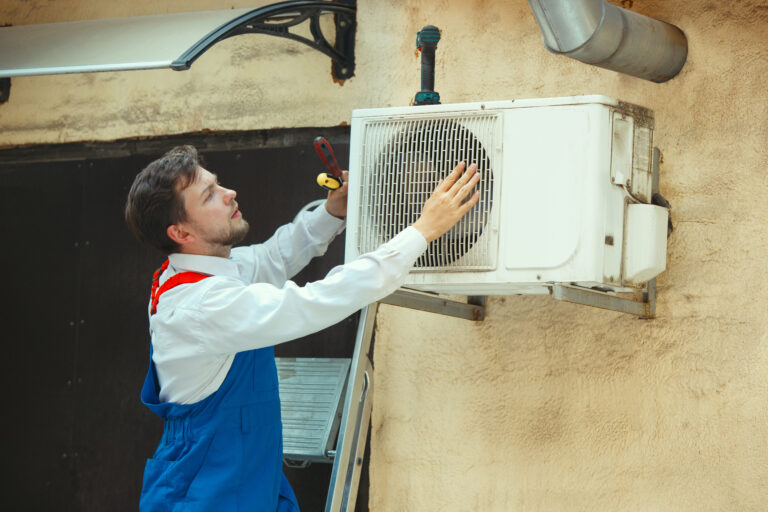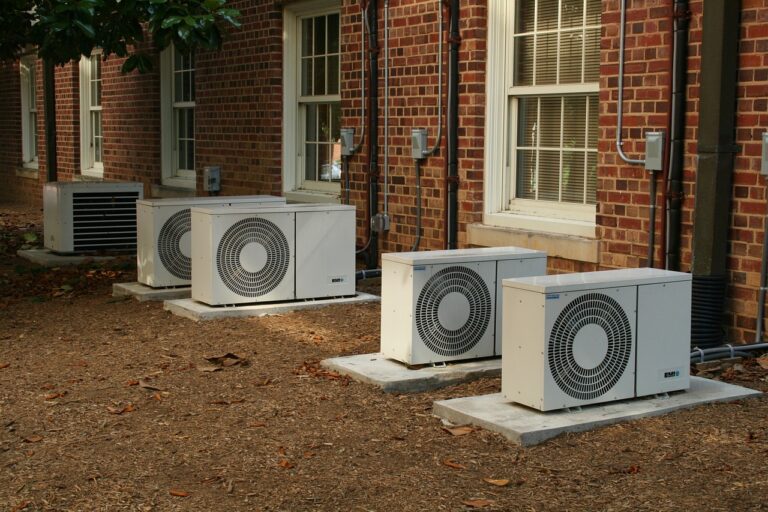The Ultimate DIY AC Maintenance Checklist for Homeowners
A well-functioning HVAC system is crucial for maintaining a comfortable home environment, particularly during the hot summer months.
Regular maintenance of your air conditioner can significantly extend its lifespan and prevent costly breakdowns. By performing routine checks and tasks, homeowners can ensure their cooling systems operate efficiently, leading to lower energy bills and more consistent cooling throughout their homes.
For more detailed steps on successful air conditioner repair, you can refer to important steps for successful air conditioner, which provides valuable insights into maintaining your HVAC system.
Key Takeaways
- Regular HVAC maintenance extends the lifespan of your equipment.
- Proper air conditioner care prevents costly breakdowns.
- Maintenance optimizes your HVAC system’s performance.
- Routine checks lead to lower energy bills.
- Consistent cooling is achieved through regular maintenance.
Why Regular AC Maintenance Matters
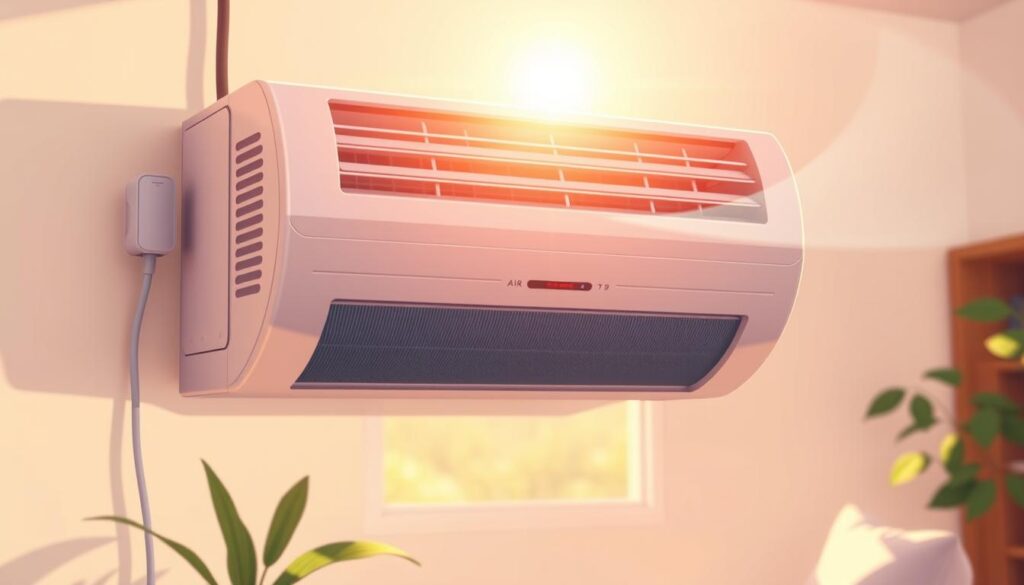
The significance of regular AC maintenance cannot be overstated, as it directly impacts the system’s performance and energy costs. Regular preventive maintenance is key to keeping your equipment running longer and more efficiently, while also helping to reduce utility costs.
A well-maintained air conditioning system operates more efficiently, requiring less electricity to cool your home effectively. As noted by experts, “A clean AC also helps to reduce energy costs, improve air quality inside your home and prevent unexpected breakdowns that require costly repairs.” This is because dust and debris accumulation on critical components can force your air conditioning system to work harder, increasing energy consumption by up to 15-20% and significantly raising your utility costs.
Energy Savings and Cost Benefits
Regular AC maintenance directly impacts your monthly energy bills. By ensuring your system operates efficiently, you can save on energy costs. For more information on the benefits of regular HVAC maintenance, visit https://acrepairnearme.services/what-are-the-benefits-of-regular-hvac-maintenance/.
Extended System Lifespan
Routine maintenance extends your HVAC system’s lifespan by preventing premature wear and tear on vital components, potentially adding 5-10 years to your unit’s operational life.
Improved Indoor Air Quality
A properly maintained air conditioner creates a healthier indoor environment by improving air quality through better filtration and reducing the circulation of allergens, dust, and other airborne contaminants.
Essential Tools for DIY AC Maintenance
Before diving into DIY AC maintenance, it’s crucial to have the right tools at your disposal. Proper maintenance of your air conditioning unit ensures it runs efficiently and effectively. To achieve this, you’ll need a variety of tools.
Basic Tools Every Homeowner Should Have
A complete DIY AC maintenance toolkit should include basic items such as screwdrivers (both flathead and Phillips), pliers, and a digital multimeter for electrical testing. A fin comb is also essential for straightening bent condenser fins on your HVAC system.
Safety Equipment and Precautions
Safety should always be your priority when performing AC maintenance. Make sure to have protective gear including gloves, safety glasses, and a dust mask to protect yourself from debris and potential electrical hazards. For more detailed guidelines on AC maintenance, you can refer to AC maintenance guidelines to avoid emergency.
Monthly DIY AC Maintenance Checklist
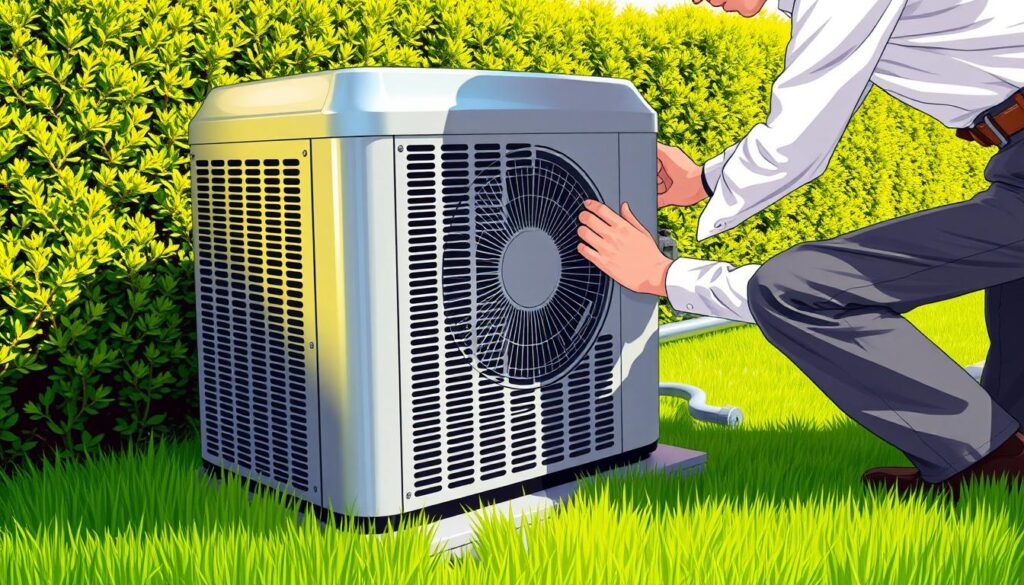
To keep your air conditioner running efficiently, a monthly DIY maintenance check is essential. Regular maintenance not only ensures your HVAC system operates effectively but also prolongs its lifespan and improves indoor air quality.
Changing or Cleaning Air Filters
One of the most critical tasks in maintaining your air conditioning system is changing or cleaning the air filters monthly. Clogged filters can restrict airflow, reduce the system’s efficiency, and potentially lead to system freezing or overheating. For homes with pets or high dust levels, consider checking and cleaning air filters twice monthly.
As noted by HVAC experts, “A clean air filter is crucial for maintaining the health and efficiency of your air conditioning system.” Regularly changing or cleaning your air filters is a simple yet effective way to ensure your system runs smoothly.
Clearing Debris Around Outdoor Units
The area around your outdoor AC unit should be clear of debris to ensure proper airflow. Remove leaves, weeds, and any other material within a 2-foot radius around the unit. This simple task helps prevent the unit from working harder than necessary, thus saving energy and reducing wear on the system.
Checking Thermostat Settings and Functionality
Regular inspection of your thermostat ensures it’s accurately reading temperatures and properly cycling your HVAC system. Verify that the thermostat settings match the temperature output to ensure the AC unit works properly. This helps prevent energy waste and maintains consistent comfort levels throughout your home.
| Thermostat Setting | Expected Outcome |
|---|---|
| Correct Temperature | Efficient Cooling |
| Incorrect Temperature | Increased Energy Bills |
Inspecting Vents and Registers
Checking all vents and registers monthly for dust accumulation and proper airflow is crucial. Dusty or blocked vents can lead to uneven cooling and reduced system efficiency. Ensure that all vents are open and unobstructed to maintain optimal system performance.
“Regular maintenance of vents and registers is key to ensuring consistent airflow and comfort throughout your home.”
By following this monthly DIY AC maintenance checklist, you can significantly improve the performance and longevity of your air conditioning system. Regular checks and maintenance tasks help ensure your HVAC system operates efficiently, providing a comfortable indoor environment while minimizing energy consumption.
Seasonal AC Maintenance Tasks
As the seasons change, your air conditioning system’s needs change too, requiring specific maintenance tasks to ensure optimal performance.
Spring Preparation Checklist
Spring is a critical time to prepare your air conditioning system for the warmer months ahead. Start by cleaning the area around the outdoor unit to ensure proper airflow. Check the evaporator coil and condenser coils for any dirt or debris and clean them if necessary. It’s also a good time to check the refrigerant levels and inspect the evaporator coil for any signs of damage or ice buildup.
For more detailed tips on maintaining your AC condenser, visit our guide on tips for keeping your AC condenser in good.
Summer Maintenance Tips
During the summer months, your cooling system works hardest, making regular checks crucial. Ensure the condensate drain line is clear to prevent clogs, and monitor your system’s performance to catch any potential issues early. Regular maintenance during summer can help prevent unexpected breakdowns during peak heat periods.
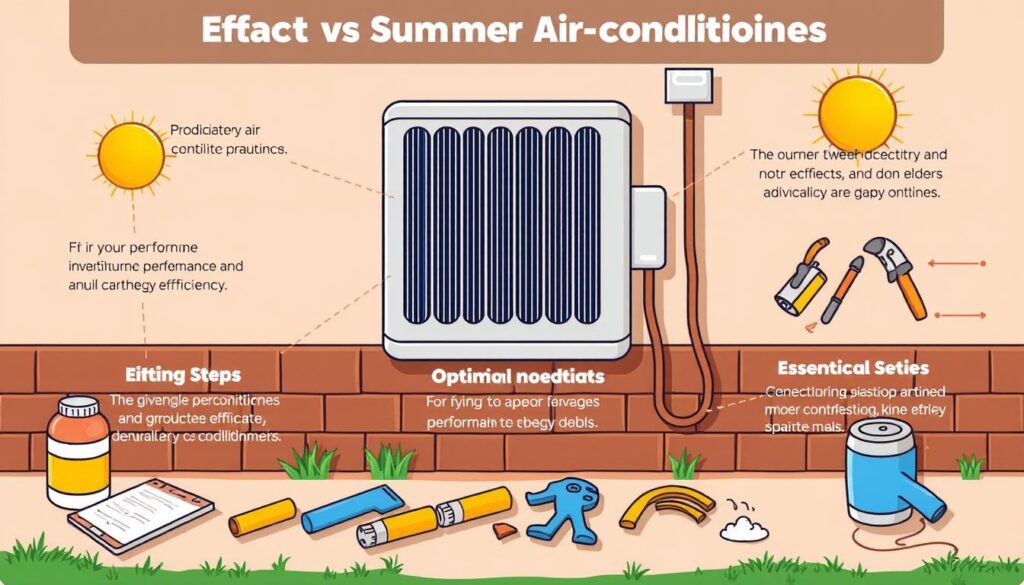
Fall Shutdown Procedures
As fall approaches, it’s time to prepare your air conditioning system for the colder months. Clean the outdoor unit and cover it properly if recommended by the manufacturer. Ensure the area around the unit is clear of debris to prevent damage during winter. It’s also a good opportunity to test your heating unit to ensure it’s working correctly.
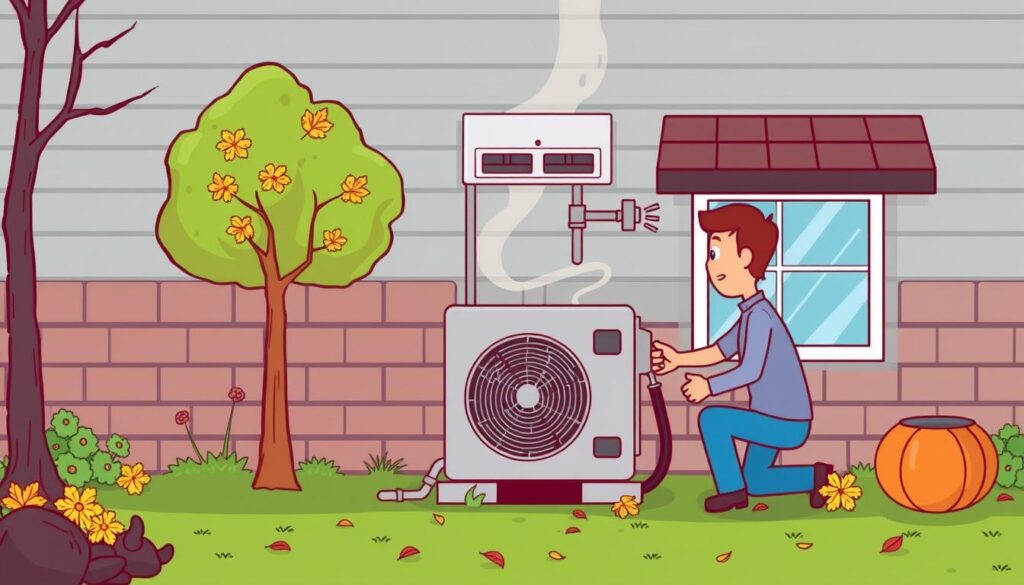
By following these seasonal maintenance tasks, you can ensure your air conditioning system remains efficient and effective throughout the year. Regular maintenance not only prolongs the lifespan of your system but also helps in reducing energy bills and preventing costly repairs.
Advanced DIY AC Maintenance Procedures
For homeowners looking to take their AC maintenance to the next level, advanced DIY procedures can help ensure optimal performance and efficiency. While basic maintenance tasks are essential, there are several advanced procedures that can help extend the life of your air conditioning unit and prevent costly repairs.
Cleaning Evaporator and Condenser Coils
Cleaning the evaporator and condenser coils is a crucial advanced maintenance task. These coils play a vital role in heat transfer and directly impact your air conditioner’s efficiency and cooling capacity. To clean the evaporator coil, turn off power to the unit, remove access panels, and use a soft brush and specialized no-rinse coil cleaner to gently remove dirt buildup without damaging the delicate aluminum fins. The condenser coil should also be cleaned regularly to ensure optimal performance.
Clearing Condensate Drain Lines
The condensate drain line is responsible for removing moisture from the evaporator coil. To prevent blockages caused by debris or a build-up of mould or algae, it’s essential to inspect and clean the line regularly. Pouring a cup of white vinegar or specialized drain cleaner through the access point near the indoor unit, followed by flushing with water, can help prevent algae and mold growth.
Checking Refrigerant Lines and Connections
When checking refrigerant lines, look for signs of oil around connections, which can indicate leaks. Ensure that the insulation is intact on the larger suction line and that all lines are securely fastened without excessive vibration. This can help prevent refrigerant leaks and ensure optimal system performance.
| Component | Inspection Task | Frequency |
|---|---|---|
| Refrigerant Lines | Check for signs of oil around connections | Every 6 months |
| Suction Line | Ensure insulation is intact | Every 6 months |
| Refrigerant Lines | Check that all lines are securely fastened | Every 6 months |
Inspecting Electrical Components and Wiring
Inspecting electrical components requires careful attention to safety. Always disconnect power first, then check for loose connections, burnt or discolored wiring, and corrosion on terminals that could cause system failures. For homeowners comfortable with more advanced maintenance, checking capacitor condition and measuring motor amperage can help identify potential issues before they lead to complete system breakdown.
By following these advanced DIY AC maintenance procedures, homeowners can help ensure optimal performance, efficiency, and longevity of their air conditioning unit.
When to Call the Professionals
While DIY maintenance is crucial, there are times when calling a professional is the best course of action for your air conditioning system. If you’re unsure about how to complete any item on our AC maintenance checklist or don’t feel comfortable doing so, it’s best to call an AC professional.
Certain situations require professional intervention, including:
- Refrigerant leaks
- Electrical issues
- Unusual noises
- When your system fails to cool properly despite basic maintenance
- Complex electrical problems or major component failures
Professional HVAC technicians have the specialized tools and expertise to safely handle refrigerant and diagnose complex issues. For homes with specialized systems, such as ductless mini-splits or geothermal heat pumps, professional maintenance is especially important.
Annual professional maintenance is recommended even for diligent DIY homeowners to ensure optimal air quality, comfort, and energy efficiency throughout your home.
